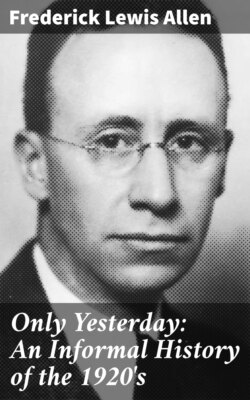Читать книгу Only Yesterday: An Informal History of the 1920's - Frederick Lewis Allen - Страница 6
На сайте Литреса книга снята с продажи.
♦ II ♦ BACK TO NORMALCY
ОглавлениеTable of Contents
Early on the morning of November 11, 1918, President Woodrow Wilson wrote in pencil, on an ordinary sheet of White House stationery, a message to the American people:
My Fellow Countrymen: The armistice was signed this morning. Everything for which America fought has been accomplished. It will now be our fortunate duty to assist by example, by sober, friendly counsel, and by material aid in the establishment of just democracy throughout the world.
Never was a document more Wilsonian. In those three sentences spoke the Puritan schoolmaster, cool in a time of great emotions, calmly setting the lesson for the day: the moral idealist, intent on a peace of reconciliation rather than a peace of hate; and the dogmatic prophet of democracy, who could not dream that the sort of institutions in which he had believed all his life were not inevitably the best for all nations everywhere. Yet the spirit of the message suggests, at the same time, that of another war President. It was such a document as Lincoln might have written.
But if the man in the White House was thinking of Abraham Lincoln as he wrote those sentences--and no doubt he was--there was something which perhaps he overlooked. Counsels of idealism sometimes fail in the relaxation that comes with peace. Lincoln had not lived to see what happens to a policy of "sober, friendly counsel" in a post-war decade; he had been taken off in the moment of triumph.
Woodrow Wilson was not to be so fortunate.
